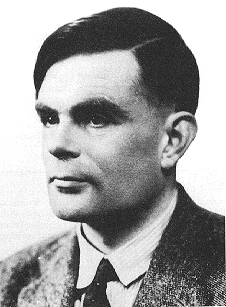 Alan Turing
Alan Turing
 Alan Turing
Alan TuringAlthough Turing made significant contributions to group theory, number theory, and artificial intelligence, he is best known for his work in the theory of computing. In a fundamental paper published in 1936, he introduced the theoretical model of computer now called the Turing machine, and proved that there are some natural problems this model cannot solve.
During World War II, Turing played a major role in British codebreaking activities at Bletchley Park.
In 1952, Turing was arrested for "gross indecency" after a burglary led to the discovery of his affair with Arnold Murray. Overt homosexuality was taboo in 1950's England, and Turing was forced to take estrogen "treatments" which rendered him impotent and caused him to grow breasts. On June 7, 1954, despondent over his situation, Turing committed suicide by eating an apple laced with cyanide.